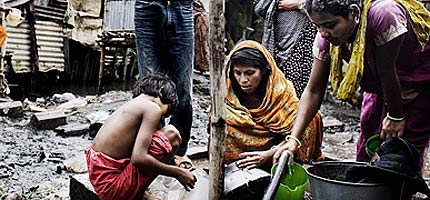[En anglais & allemand]
Inde: Elle n’avait pas le droit de se baigner dans la même eau que les chiens
Education Helps Dalit Woman Find Her Strength
Rama Devi Hansraj comes from Bhubaneshwar, the capital of India’s northeastern state of Orissa. She may not have experienced removing human excrement from dry toilets with bare hands, a task assigned to Dalits like her, who were once called “untouchables”.
But Hansraj, aged 28, says she knows what it means to be considered below India’s caste system. Growing up as a child of Hindu parents, she had to remember not to drink water from a tumbler reserved for upper caste children. The penalty was to face beatings from upper-caste teachers.
Hansraj learned early on that cattle, dogs and pigs could bathe in a pond intended exclusively for kallars (non-Dalits). But a Dalit like her could not bathe in the same water.
She was one of 95 representatives of churches and other organizations worldwide who participated in a 21-24 March conference in Bangkok, Thailand, organized by the World Council of Churches and the LWF, and hosted by the Christian Conference of Asia.
The conference aimed to raise awareness of caste-based discrimination ahead of the 20 to 24 April United Nations’ Durban Review Conference, to be convened in Geneva, to review the implementation of the Plan of Action adopted by the 2001 World Conference against Racism, Racial Discrimination, Xenophobia and Related Intolerance in Durban, South Africa. In Bangkok, delegates urged governments taking part in the Durban review conference to “accept the inclusion of caste-based discrimination” in their discussions.
Practical Reasons
Despite facing such discrimination at home, Hansraj remained a Hindu for some time due to practical reasons. “As a Hindu, I could avail myself of the government’s affirmative action programs,” she said in an interview with this writer during the ecumenical conference.
In 1950, India’s Hindu Dalits were made eligible for free education and reserved government jobs to improve their social status. Such benefits were extended to Sikh Dalits in 1956 and then to Buddhist Dalits in 1990. However, Christian Dalits who account for more than two thirds of some 27 million Christians in India, as well as Muslim Dalits, are denied these rights.
Through the affirmative action programs, Hansraj received an education and eventually qualified for an international fellowship at the University of London, United Kingdom, where she took a master’s degree in human rights.
Globalizing Opportunities
Subsequently Hansraj converted to Buddhism. Since 2006, she has been working for the aid organization Catholic Relief Services in India, where she has collaborated with Christian churches in Dalit rights’ advocacy.
As an aid worker, Hansraj has helped in rebuilding the lives of Dalit Christians in India’s troubled Orissa state, where thousands of Christians were attacked by Hindu extremists in 2008.
“Besides helping build homes, we are also helping psychologically and spiritually rehabilitate the people, especially the children who have remained traumatized by the violence in Orissa,” she said.
To Hansraj, a mother of two and the wife of a Baptist minister, also a Dalit, education represents a major step in the journey to Dalit liberation. She stressed that amid the Dalits’ difficulties and suffering, education could help empower them and turn their position of “victimhood” into one of strength.
She currently attends evening classes at a law school in Chennai, southeastern India, where she is a first-year student. “My human rights education and law background would help me in my advocacy for Dalit justice and rights,” she said. “Besides education, globalization—not in the sense of globalizing markets but in globalizing opportunities—can one day help make caste-based discrimination a thing of the past,” she added.
Adapted from Maurice Malanes’ feature article for the Geneva-based Ecumenical News International

